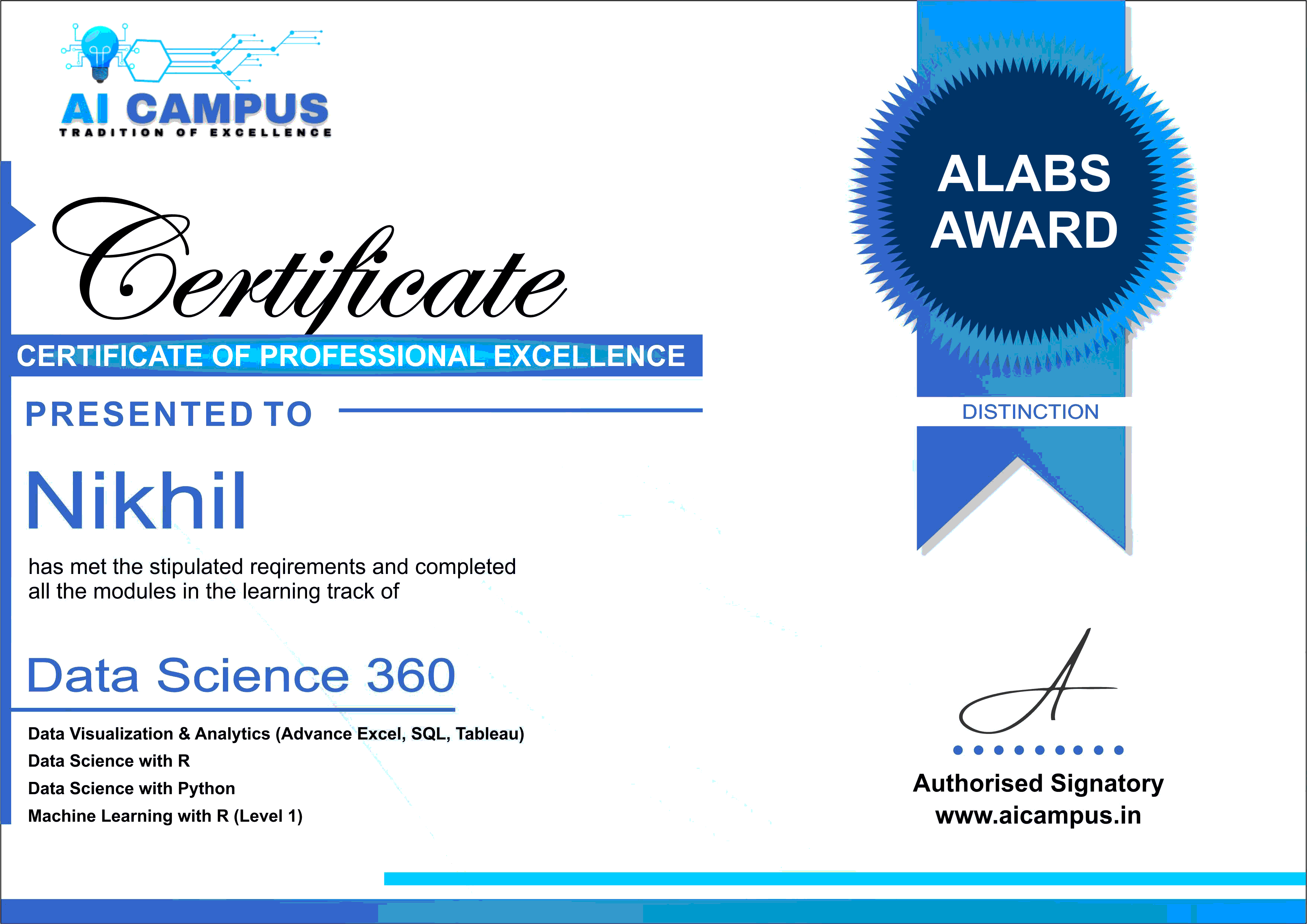Data Visualization & Analytics
- 120 hours
- 12 Classes
- Classroom
- Online
- eLearning
Bangalore
Gurgaon



No of classes X Hours

Self Study Hours

Placement Readiness Program
Understand the domain of business analyst with the Best business analyst course by Ai Campus. The curriculum you get here is made by the top educators in the industry, keeping in mind what the current demands of the IT sector are. Learners get equipped with sought-after skills in data mining, analytics reporting, and predictive analytics.
Acquire a thorough understanding of time series analysis, econometrics, and forecasting to predict future results based on past trends. Beyond the fundamentals, our Business Analytics 360 Courses provide practical instruction using commonly used tools like Excel, SQL, and PowerBI. With a solid foundation in R and Python, you can dive into advanced analytics and make sure you know all of the newest tools and methods available.
Enroll in our Business Analytics Course with Placement assistance and acquire the skills to efficiently extract valuable insights from vast data sets within minutes. With the help of this extensive program, you will acquire the knowledge and skills necessary to successfully negotiate the challenges of data analytics and make decisions that are well-founded in statistical principles. The learning objectives of this course is very clear, have a look:
Business analytics creates future projections by symbiotically integrating past and present data, giving organizations a roadmap based on data. During the course at Ai Campus, students gain proficiency in the four essential categories of analytics:
Together, these four components make up the full business analytics lifecycle, which includes data collection, analysis, and prediction and ultimately leads to improved decision-making procedures.
At Ai Campus, we offer multiple learning modes for learners keeping in mind that each student is unique and connects to a different kind of mode based on the time they can spare and what suits their schedule. Select the one that fits you the best.
Self-paced Blended eLearning: Take use of your learning management system's on-demand e-learning video sessions. Enjoy the flexibility of regular weekend interactive live case study and doubt sessions, accompanied by additional support through mail, online platforms, or in-person assistance
Classroom & Bootcamp: Experience hands-on learning with in-person mentorship. Select from weekend or weekday classroom boot camps to receive hands-on, interactive instruction.
Interactive live online: Learn in our live online sessions with our faculty of the IT industry. Participate in fully interactive sessions with real-time conversations and question-and-answer exchanges from any location at your convenience.
When learners decide on pursuing a specific course, Business Analytics Course in this case they want to know the scope of it. This section of the website will help you understand the job roles you can take up after this course and the scope of business analytics.
Talking about statistics: the U.S. Bureau of Labor Statistics (BLS), has reported that the demand for business analysts is expected to surge by 25% by 2030. Other job roles that are related to Business analytics are also going to expand. Market research analysts, for example, are expected to have a 22% increase in employment by 2030. In contrast, growth rates for jobs like management analysts and budget analysts are expected to be 14% and 5%, respectively.
|
Role |
Years of Experience |
Salary Range in India [INR] |
|
Business / Data Analyst |
2-4yrs |
6-12 LPA |
|
Senior Business Analyst |
2-4yrs |
9-18 LPA |
|
Team Lead/ Manager |
5-7yrs |
4-18 LPA |
|
Principal Business Analyst |
8+ yrs |
16-29 LPA |
|
Senior Principal BA |
8+ yrs |
18-29 LPA |
|
Director, BA |
10+ yrs |
19-29 LPA |
|
Senior Director, BA |
12+ yrs |
25-31 LPA |
|
VP, Business Analytics |
12-14+ yrs |
30-41 LPA |
|
Senior VP, BA |
15+ yrs |
40-45 LPA |
Let us take a look at the curriculum offered by Ai Campus for the Business Analytics Certification Course. Students will study the modules and content given below:
Our BA Analyst Course is ideal for prospective students with a variety of different backgrounds, such as Engineering, Finance, Mathematics, and Business Management. This online course is designed to meet the needs of people who want to learn new skills, improve their current ones, transition to a different domain, or upskill.
However, learners who do not belong to the streams that are mentioned above can pursue a career in data analytics as well. The course remains accessible to individuals from various backgrounds, demonstrating that with dedication and determination, anyone can thrive in the field of business analytics.
Every learner joins IT courses with a goal in their mind. This section will help you understand what the future holds after completion of your Business Analytics Certification Course. Below are the job opportunities you can venture into:
To be in the job roles mentioned above there are multiple skills that students pick up in this course. Have a look at them:
Ai Campus focuses on teaching through practical work rather than just theoretical classes. Learners are engaged in multiple assignments and capstone projects that teach business analytics more than books can. Capstone projects add a heavy weight to the CV as well and we offer in-built projects, hence at the time of placement learners can show they have more experience than just open-source projects.

Online mode is also available for learners. Here interactive live online sessions happen. Join our expert-led live online sessions from any location. Engage in fully interactive discussions with real-time

In this mode, students can use the access they have to our learning management system and study through it. This mode allows them to access and ask for on-demand video lectures. Get comprehensive doubts to support via mail, online, or in person.

In this learning mode, learners get to meet the mentors and have in-person study sessions. This mode is available on weekdays and weekends. Learners who wish to attend in-class sessions should go for it.

Learners can also select the learning mode as per the charges of that particular mode. Below each mode is explained with their installments and other details.
 Weekend Batches
Weekend Batches Key Features:
 Self-paced Blended
Self-paced Blended key features:
 Weekday Bootcamp
Weekday Bootcamp Key Features:

Get individualized help from a group of skilled experts to create an effective resume and online profiles that are suited to your experience and educational background.

Take advantage of one-on-one sessions for interview preparation, which might include practice interviews if needed.

Access diverse job opportunities through requirements from organizations, clients, HR consultants, and a vast network of Ai Campus alumni working across various companies.

Enjoy ongoing support for as long as needed. Many of our students take advantage of the abilities they have learned in the course to receive numerous interview calls and appealing career alternatives.
Bangalore
Gurgaon
You can start along the road to becoming a successful data analyst across several disciplines by enrolling in a well-designed data analytics course. Over the past ten years, the demand for data specialists has increased tremendously across industries, and getting training in data analytics is one of the greatest ways to keep up.
Be it analyzing a sporting event or detecting early-stage cancer; a data analyst has a role in everything. The scope of data analytics as a discipline has been growing since its inception. Every task, every process, every little gadget connected to the internet produces data that can be turned into vital information. The newfound utility of data has increased the importance of analytics and data science in India by manifolds. Therefore, a reputed data analytics certification course in India can boost your career to get a flying start in the industry.
A subset of data science called data analytics has a much narrower field of study. You can learn how to handle data collecting, cleansing, and organisation as well as descriptive and predictive data analysis through a data analytics certification training programme.
Finding patterns in data, posing pertinent questions, and setting up machine learning algorithms to provide answers are the main objectives of a data science training course. Depending on your experience, knowledge, and, of course, the mentors at Ai campus' expert advice, you can select a course.
Data science and data analytics careers can take many different forms. For instance, the business analytics 360 course will assist you in starting from scratch to become a business analyst. You can increase your understanding of algorithms and predictive modelling with the aid of a machine learning course. For each of them, Ai campus offers the top data analytics education in Bangalore, Noida, and Delhi.
Since data science is a broad field, it is challenging to provide a definitive response. Nevertheless, we may consider some real-world situations that our alumni have encountered. To confirm their claims, look them up on LinkedIn.
After receiving training from Ai Campus, we transformed from a leader in the manufacturing industry into a global data science pioneer. Aggarwal's learning curve was very easy for a non-programmer. He was able to devote a sufficient amount of time to practising programming while still paying attention to other important factors thanks to the course's carefully planned framework. His development was quick, focused, and successful. He is currently making contributions to analytics and customer data science.
The journey taken by Archish Rai Kapil from history graduate to data analyst at Air India is pretty inspiring. He began with advanced Excel expertise and accumulated certifications in a variety of analytics technologies. His lack of CS experience never got in the way, and Archish graciously gives Ai Campus some of the credit for providing him with "just what he needed."
These two examples were chosen from a long list with the intent of demonstrating that anyone can make the transition to data science and highlighting the fact that active professionals can, with a little extra effort, obtain a certification in data analytics and do so successfully.
In order to offer IT/ITES professionals a comprehensive range of data science training programmes, Ai Campus was founded in 2011. There are numerous organisations operating with a broadly comparable objective in mind. Ai Campus has become a trusted reputation over the past ten years by acting in specific ways correctly.
The mission of Ai Campus is to empower young people in India to take advantage of opportunities in the future. The finest data science institute in India, according to Analytics India Magazine, is Ai Campus.